Showing posts tagged Buddhism
I had some time on my hands two weekends ago and was feeling a bit of an itch to build something, so I decided to do a project I’ve had in the back of my head for a while: a meditation timer.
If you’ve been following this log, you’d know that meditation has been a pretty major interest of mine for the past year. The foundation of my practice is a daily round of seated meditation at home, where I have been attempting to follow the breath and generally try to connect with the world for a set period every day (usually varying between 10 and 30 minutes, depending on how much of a rush I’m in).
Clock watching is rather distracting while sitting so having a tool to notify you when a certain amount of time has elapsed is quite useful. Writing a smartphone app to do this is an obvious idea, and indeed approximately a zillion of these things have been written for Android and iOS. Unfortunately, most are not very good. Really, I just want something that does this:
- Select a meditation length (somewhere between 10 and 40 minutes).
- Sound a bell after a short preparation to demarcate the beginning of meditation.
- While the meditation period is ongoing, do a countdown of the time remaining (not strictly required, but useful for peace of mind in case you’re wondering whether you’ve really only sat for 25 minutes).
- Sound a bell when the meditation ends.
Yes, meditation can get more complex than that. In Zen practice, for example, sometimes you have several periods of varying length, broken up with kinhin (walking meditation). However, that mostly happens in the context of a formal setting (e.g. a Zendo) where you leave your smartphone at the door. Trying to shoehorn all that into an app needlessly complicates what should be simple.
Even worse are the apps which “chart” your progress or have other gimmicks to connect you to a virtual “community” of meditators. I have to say I find that kind of stuff really turns me off. Meditation should be about connecting with reality in a more fundamental way, not charting gamified statistics or interacting online. We already have way too much of that going on elsewhere in our lives without adding even more to it.
So, you might ask why the alarm feature of most clock apps isn’t sufficient? Really, it is most of the time. A specialized app can make selecting the interval slightly more convenient and we can preselect an appropriate bell sound up front. It’s also nice to hear something to demarcate the start of a meditation session. But honestly I didn’t have much of a reason to write this other than the fact than I could. Outside of work, I’ve been in a bit of a creative rut lately and felt like I needed to build something, anything and put it out into the world (even if it’s tiny and only a very incremental improvement over what’s out there already). So here it is:

The app was written entirely in HTML5 so it should work fine on pretty much any reasonably modern device, desktop or mobile. I tested it on my Nexus 5 (Chrome, Firefox for Android)1, FirefoxOS Flame, and on my laptop (Chrome, Firefox, Safari). It lives on a subdomain of this site or you can grab it from the Firefox Marketplace if you’re using some variant of Firefox (OS). The source, such as it is, can be found on github.
I should acknowledge taking some design inspiration from the Mind application for iOS, which has a similarly minimalistic take on things. Check that out too if you have an iPhone or iPad!
Happy meditating!
1 Note that there isn’t a way to inhibit the screen/device from going to sleep with these browsers, which means that you might miss the ending bell. On FirefoxOS, I used the requestWakeLock API to make sure that doesn’t happen. I filed a bug to get this implemented on Firefox for Android.

He sits on the edge of my couch, stoic. At rest, yet alert for anything to happen at any moment. Whether that be a mouse running across the room (fat chance here) or me getting up to go into the kitchen. I took this picture just after zazen (meditating) — I struggle and struggle and yet right beside me sits a creature that constantly practices in the highest form (shikantaza, “just sitting”) without even trying. An example for me to follow?
A few months ago, I started blogging a bit about my fledgling Buddhist meditation practice, and then abruptly stopped. I thought I’d write just a few words about why I didn’t continue.
Over time, one of the things that I found most difficult about my practice was keeping it relatively pure. The whole point is to just sit and follow the breath with no extra motivation or hidden agenda. Given that, having it in the back of my mind to later try to explain my practice to a broad audience was at best a distraction. At worst, I worried that it might actually be hindering my progress.
After some thinking about it where my desire to explain this stuff came from, I determined that there was a root desire there to make the world conform to my expectations of what it *should* be. Which, if you stop and think about it, is just another form of greed. We often think of our desires as being about personal gratification (food, sex, cars, whatever) but that’s really too narrow a view — we’re social creatures, and our desires and aversions inevitably extend to the social sphere as well.
I suppose that sounds rather judgemental or moralistic, but it’s really not intended that way. This is just the nature of human experience, and I am certainly not exempt from that. There is probably at least some element of this greed at the root of much of my writing, whether it be discussing my latest computational vision problem at work or how I think coffee should be brewed — but at least in those cases articulating myself doesn’t interfere with the activity itself.
A frequent misunderstanding of the practice of Buddhism is that it’s about eliminating desire. As I understand it, it’s not so much that, as it is about putting desires in proper perspective. To not be ruled by them. If I have a social purpose in the back of my head during the practice, well, that’s going to be a problem. It’ll be constantly in the background, subtly influencing what I process and how I process it (e.g. the thought “how am I going to describe that”). I have enough issues meditating without adding to them.
Moreover, one of the things I’ve realized over the last few months is that the way people process the world around the world is pretty differently. I’m lucky enough to have a mind able to sit still for (average) 20 minutes a day. Not perfectly of course — many times I feel like I’m caught up with a million random thoughts for 90% of a session, but as I understand it that’s just part of the process. At least I can sit still! I’ve since learned that this isn’t easy at all for other people (the urge to get up and do something else is overwhelming) and I really have no insight at present into what would make it easier for them (they had tried most of what I suggested to no avail). So I am a bit concerned that what I have to say would act more as a hindrance to the journey of others rather than a help.
All this is not to say that I’m not happy to discuss my experiences one on one with anyone who’s interested. If you’re curious, by all means feel free to contact me — though I suspect you’d probably do better reaching out to a dedicated teacher who has more experience in these matters than I. If you can’t find one, I would again recommend Mindfulness in Plain English.

Okay, remember last time when I said I was going to continue my “sham of a human existence” and not commit to a Zen practice? Well, I came back to the idea sooner than I thought: the experience was just too compelling for me not to do some further exploration. In some strange coincidence, Hacker News had a great thread on meditation just after I wrote my last blog entry, where a few people recommended a book called Mindfulness in Plain English. I figured doing meditation at home didn’t involve any kind of huge commitment (don’t like it? just stop!), so I decided to order it online and give it a try.
Mindfulness in Plain English is really fascinating stuff. It describes how to do a type of Vipassana (insight) meditation, which is practiced with a great deal of ritual in places like Thailand, India, and Sri Lanka. The book however, strips out most of the ritual and just gives you a set of techniques that is quite accessible for a (presumably) western audience. From what I can gather though, it seems like the goal of Vipassana is quite similar to that of Zen (enlightenment; release from attachment and dualism), though the methods and rituals around it are quite different (e.g. there are no koans). Perhaps it’s akin to the difference between GIMP and Photoshop: as those two programs are both aimed at the manipulation of images, both Vipassana and Zen are aimed at the manipulation of the mind. There are differences in the script of how to do so, but the overarching purpose is the same.
Regardless, the portion of the C method that the book describes is almost exactly that which I tried at the Zen workshop: sit still and pay attention to your breathing. There’s a few minor distinctions in terms of the suggested posture (the book recommends either sitting cross legged or in a lotus position vs. the kneeling posture I learnt at the workshop) and the focal point (Mindfulness recommends the tip of the nostrils). But essentially it’s the same stuff. Focus on the breath — counting it if necessary, rince, repeat.
As I mentioned before, this is actually really hard to do properly for being simple in concept. The mind keeps wandering and wandering on all sorts of tangents: plans, daydreams, even thoughts about the meditation itself. Where I found Mindfulness in Plain English helpful was in the advice it gave for dealing with this “monkey mind” phenomenon. The subject is dealt with throughout the book (with two chapters on it and nothing else), but all the advice boils down to “treat it as part of the meditation”. Don’t try to avoid it, just treat it as something to be aware of in the same way as breathing. Then once you have acknowledged it, move the attention back to the breath.
Mindfulness, as far as I can gather, is simply non-judgemental awareness of what we are doing (and what we are supposed to be doing). Every time a distraction is noticed, felt, and understood, you’ve just experienced some approximation of the end goal of the meditation. Like it is with other things (an exercise regimen, learning to play a musical instrument), every small victory should push you further and the path to where you want to go. With enough practice, it might just become part of your day-to-day experience.
Or so I’m told by the book. Up to now, I haven’t enjoyed any longlasting effects from meditation aside from (possibly?) a bit more mental clarity in my day-to-day tasks. But I’ve found the practice to be extremely interesting both from the point of view of understanding my own thought, as well as being rather relaxing in and of itself. So while I’m curious as to what comes next, I am happy enough with things as they are in the present. I’m planning to continue to meditate (20–30 minutes a day, 6 days a week), but also delve a bit deeper into the details and history of Zen and Vipasanna. More updates as appropriate.

So for a bit of a departure from the usual technical content, a personal anecdote. I went to the Montreal Zen Center today for a workshop, which was a most illuminating experience. I’d been pretty fascinated with the idea of zen for a while (see this post of mine from 2006, for example) but was pretty stuck on how to put it into practice (aside from being sure it was something you had to live). So, this was a step in that direction. After having gone to it, I wouldn’t say I’ve figured anything out (in fact I’m more confused than ever), but I would say one thing with conviction: this is the way to learn more.
It was pretty simple stuff: exactly how they describe on the web page I linked to. A short verbal introduction on some of the ideas of zen, then a tea break, then instruction on how to begin practising meditation, another tea break (this time with biscuits), then actually practising meditation, then question & answer about the meditation. It doesn’t really sound like much, and it wasn’t. But nonetheless I can’t stop thinking about the experience.
As far as I can gather, the “revelation” offered by Zen Buddhism is simple: our existence as separate, unique beings is an illusion of the mind. This illusion makes us suffer. However, it is possible with practice to overcome this illusion and realize your true nature as being one with the world. I’m probably butchering it a little bit by writing about it in this way, to a certain extent that’s me, but in another way it’s rather unavoidable since in a way the concepts are beyond words (since words imply a dualism). Regardless, the important thing isn’t to grasp zen intellectually, but to come to a natural understanding through the practice of meditation (aka “the practice”).
And on that note, the meditation is austere and almost certainly less than you’d expect. There is no prayer and very little ritual. Just a very minimal breath counting exercise conducted in a seated posture for 20 minutes, followed by a short walking exercise that lasts 5 minutes, then repeating the breath counting exercise for another 20 minutes. For its utter simplicity, I found it incredibly difficult. I imagine like anything with weeks, months, years of practice it (and the variations of it that experienced practitioners use where they meditate on koans) it would become easier.
I’m still giving thought on whether I want to take the next steps with them and begin a regular meditation practice. It sounds like really hard work (self meditation practice 6 days a week by yourself, plus regular visits to the zen center), which brings up the question: why do you want to do this? There’s a weird contradiction between realizing that you as a self don’t really exist and committing yourself radically to this kind of practice. The only thing I can call it would be a “leap of faith”. My current thinking is that I’m not quite ready for that right now, but maybe in a while. For now I think I’m pretty happy going to yoga a few times a week and living my sham of a human existence. 😉



